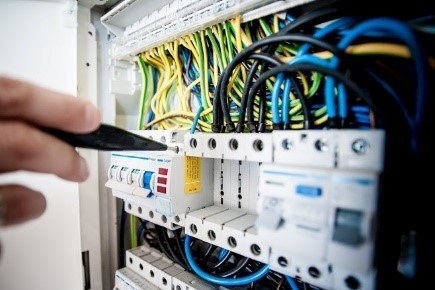News & Events
January 31, 2020
The Path to Professional Success as an Electrician

You’re ready to become an electrician. With a faster-than-average job growth outlook and a median pay of over $55,000 annually, according to the U.S. Bureau of Labor Statistics (BLS), this is a field to explore. If you’re not sure how to get started or what an electrician’s career path includes, take a look at what you need to know about this in-demand profession.
High School Diploma or Equivalency
According to the BLS, either a high school diploma or an equivalent credential (such as a GED) is necessary to enter the electrical field. Not only will your future employer want to verify you’re a high school grad or have a GED, but you may also need a diploma or equivalency exam to enroll in a trade education program.
Beyond the requirement that employers and post-secondary schools have, a high school education gives you the basics you’ll need to succeed as an electrician. From math and science (for the technical parts of the job) to language and writing (for the interpersonal parts of the job), you’ll gain the knowledge you’ll need as a future electrical professional.
Career School
The next step in your road to becoming an electrician isn’t always clear-cut. Some future electricians choose to start a trade or technical school after graduation or when they make the decision to switch careers.
But do you need a trade or technical degree to work as an electrician? This question has no universal answer. While you will need extensive training in the field, you don’t necessarily need to pay for a pricey school.
A trade or technical school will give you the basics you need to start out as an entry-level electrician, but this type of program isn’t the only training you’ll need. Read on for more information on how to get the hands-on training required for licensure as a professional electrician.
Apprenticeship Programs
Unlike classroom education, an electrical apprenticeship program provides you with practical, on-the-job training. As an apprentice, you’ll get to put what you’ve learned about the electrical trade into use in real-world situations.
Even though apprenticeships are highly hands-on, you’ll also have to complete classroom training hours. The classroom component of this type of program ensures that you’ll have the background knowledge of electrical work and the fundamentals necessary to complete calculations, understand complex systems, and complete wiring work in a safe and effective way.
Along with classroom hours, as an apprentice, you’ll also have the opportunity to work under a senior electrician. This supervised experience allows you to enter the field, learn about the job, hone your expertise, and possibly even get paid.
Licensure Exam
After you complete the requisite number of training hours, you move onto professional licensure. The specific number of classroom and hands-on training or practical hours you need to qualify for licensure depends on your state’s rules and regulations for skilled tradespeople.
To learn more about licensure qualifications, contact your state’s official government licensing body. These vary by state, as do specific licensing processes. In Ohio, the Department of Commerce’s Ohio Construction Industry Licensing Board (OCILB) issues licenses to tradespeople who work in the electrical field.
Electrical Journeyman
After completion of an apprenticeship program, licensed electricians are qualified to become journeymen. This job category is a step above a supervised apprentice but still below the master electrician title.
Journeymen electricians work independently for companies or contractors but aren’t typically ready to start their own businesses. If you plan to open your own company or work as a sole contractor, you may need to gain additional experience in the field. After you’ve worked in the industry for several years and have the experience to advance, the final step is to become a master electrician.
Are you ready to start a new career? Contact the Independent Electrical Contractors of Greater Cincinnati for more information.